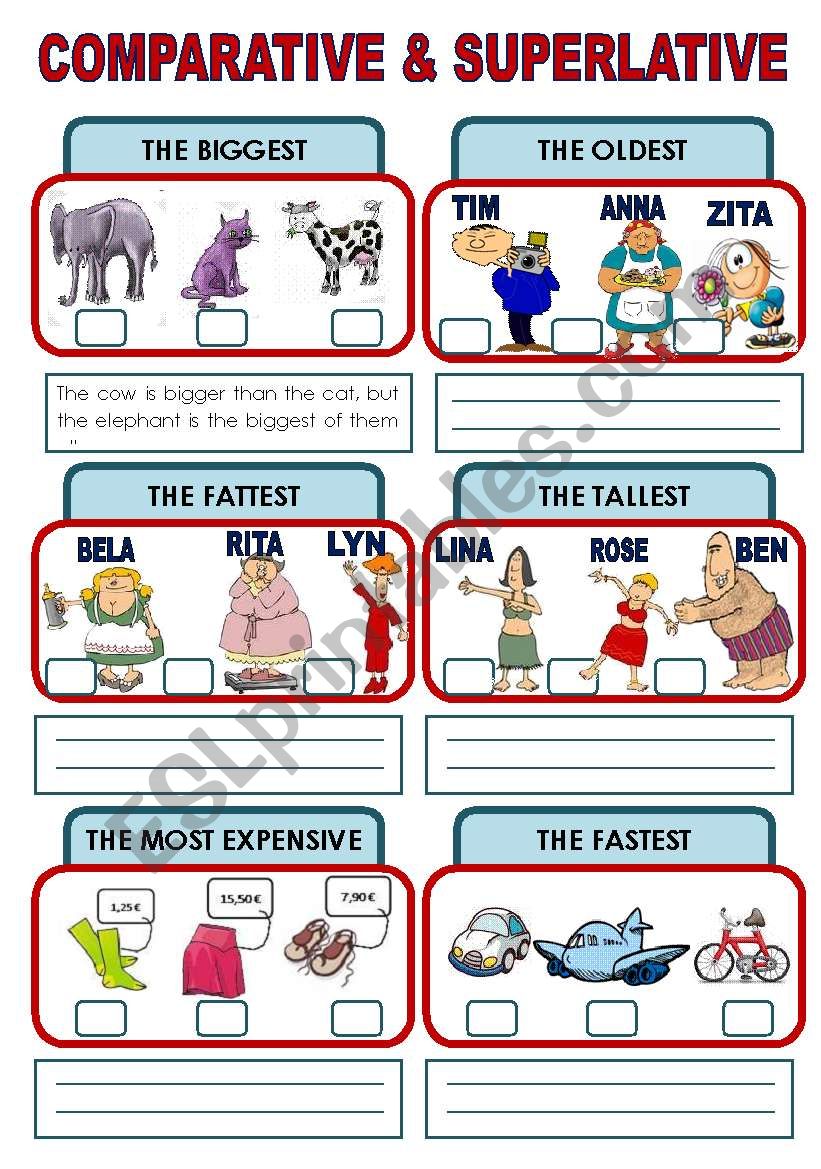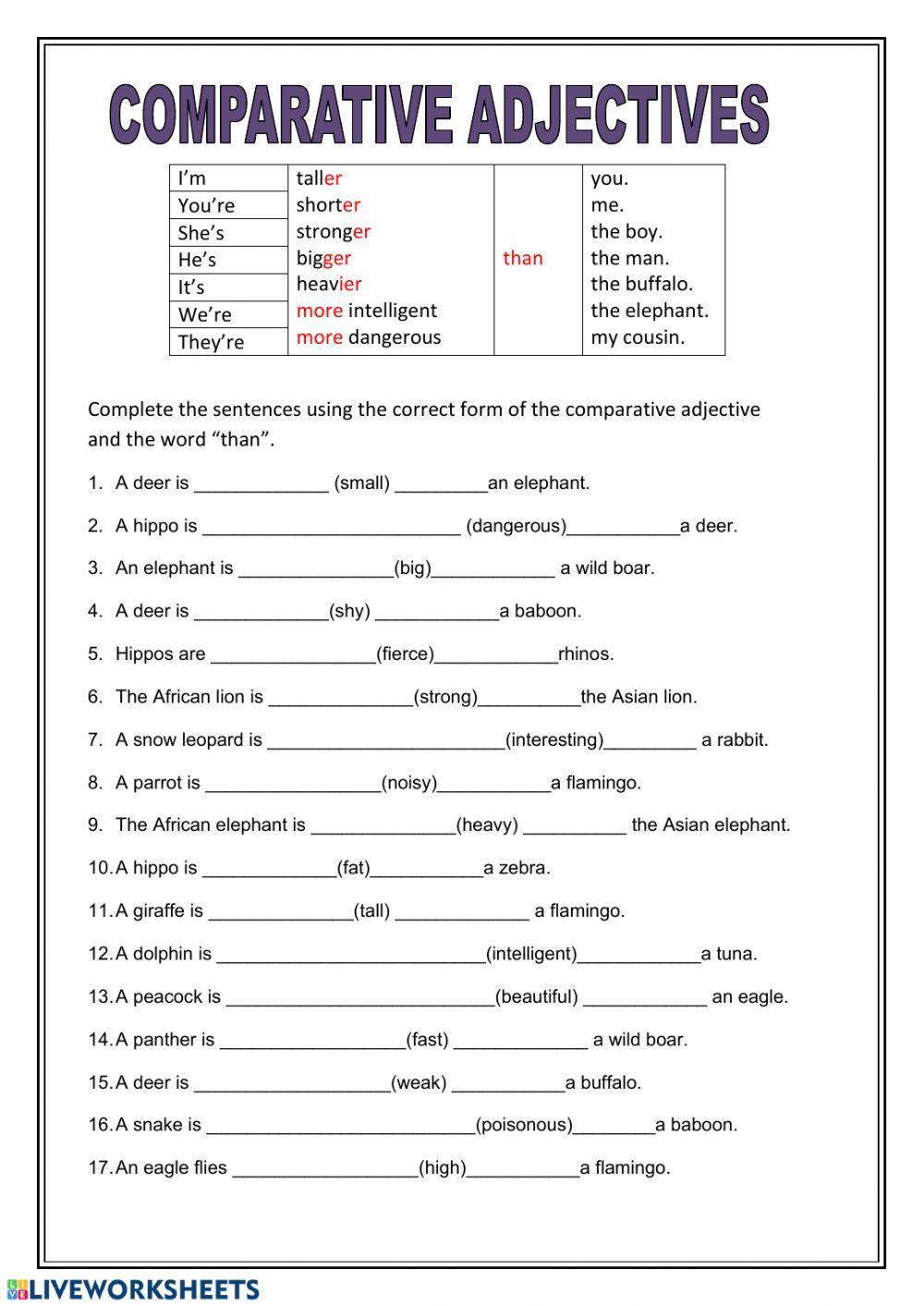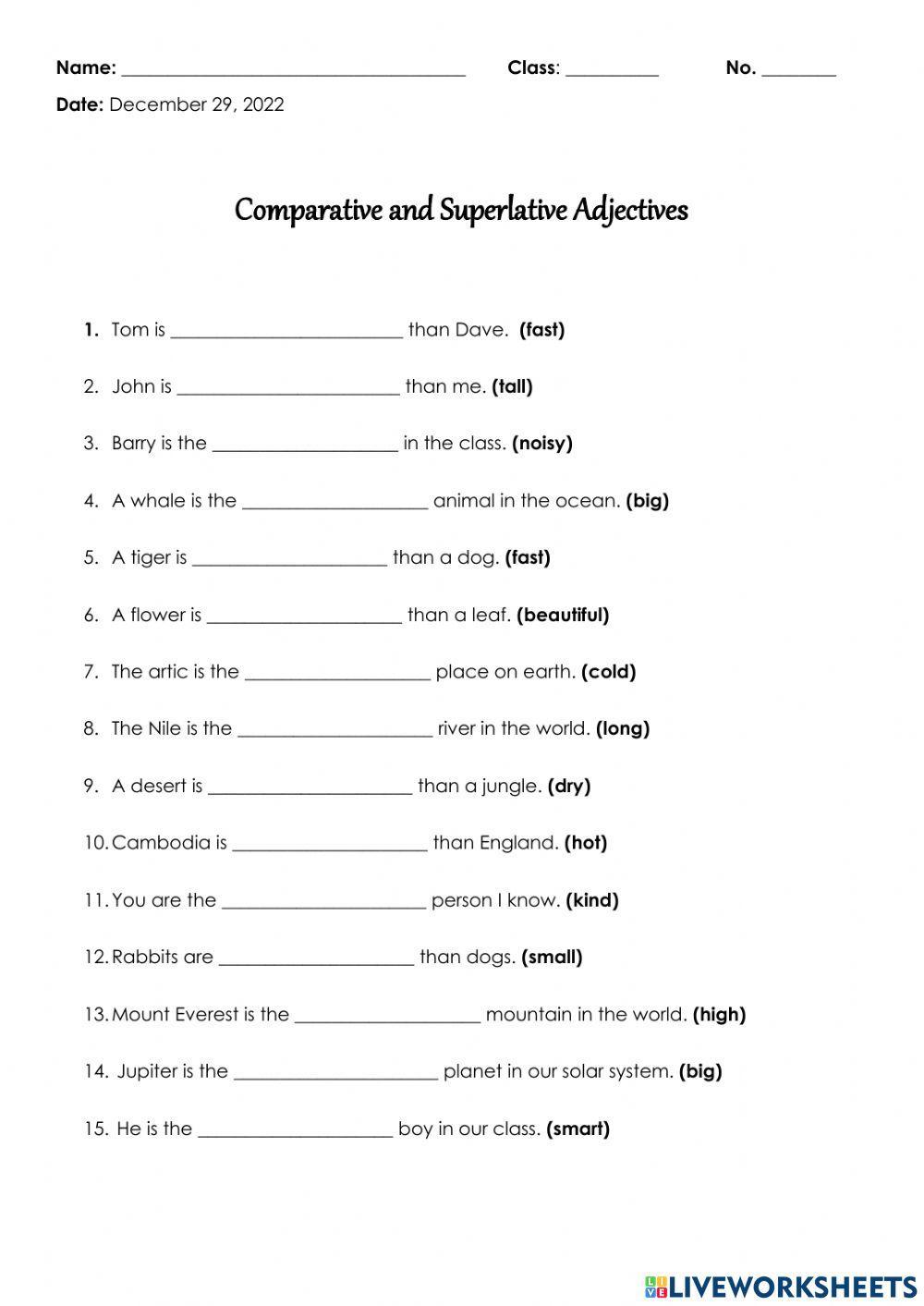
Mastering Comparatives and Superlatives: The Indispensable Role of Worksheets for Adult Learners
Effective communication in English, whether for professional, academic, or personal purposes, hinges on the nuanced use of language. Among the most fundamental yet often challenging grammatical structures are comparatives and superlatives. These forms allow us to express differences and extremes, adding depth and precision to our descriptions and arguments. For adult learners, who often come with existing linguistic frameworks and specific learning goals, mastering these concepts requires targeted, practical, and contextually relevant practice. This is where well-designed comparative and superlative for adult learners worksheets become an invaluable resource.
The Essence of Comparison: A Brief Refresher
Before diving into the specifics of worksheets, let’s briefly revisit what comparatives and superlatives are and why they matter:

- Comparatives: Used to compare two people, places, things, or ideas. They indicate which one has more or less of a particular quality.

- Examples: "This car is faster than that one." "Learning a new language is more challenging than it seems."


- Superlatives: Used to compare three or more items and indicate which one has the most or least of a particular quality.
- Examples: "Mount Everest is the highest mountain in the world." "She is the most intelligent student in the class."


The formation rules, while seemingly straightforward (adding "-er/-est" for short adjectives, using "more/most" for longer ones), come with a host of irregularities (good/better/best, bad/worse/worst) and common pitfalls (e.g., using "more" with "-er" forms). For adult learners, who may be battling "fossilized errors" from previous learning or who need to apply these rules in high-stakes professional contexts, mere rote memorization isn’t enough. They need meaningful practice that connects grammar to real-world scenarios.

Why Specialized Worksheets for Adult Learners?
Adult learners are distinct from children or teenagers in their learning styles, motivations, and needs. They often:

- Seek Relevance: They want to understand why they are learning something and how it applies to their lives (work, travel, social interactions, academic pursuits).
- Are Self-Directed: Many adults prefer self-study or supplementing classroom learning with independent practice.
- Have Prior Knowledge (and Potential Errors): They bring a wealth of life experience and, sometimes, deeply ingrained grammatical inaccuracies that need to be unlearned.
- Are Goal-Oriented: They often have specific language proficiency goals, whether it’s passing an exam, excelling in a job interview, or conversing confidently with native speakers.

Generic grammar exercises often fall short because they lack the contextual depth and real-world applicability that adults crave. This is precisely why comparative and superlative for adult learners worksheets are so crucial. They are designed with adult contexts in mind, making the learning process more engaging, efficient, and ultimately, more effective.
Types of Effective Comparative and Superlative Worksheets for Adult Learners
To truly benefit from these worksheets, it’s important to understand the variety available and how each type targets different aspects of learning:
-
Fill-in-the-Blanks (Contextualized):
- Description: These worksheets present sentences with blanks where learners must insert the correct comparative or superlative form of a given adjective or adverb.
- Adult Focus: Instead of "The cat is (big) than the mouse," adult-focused examples might be: "Our new marketing strategy is proving to be (effective) than the previous one." or "Which city do you find ____ (expensive) for living?" This forces learners to consider context and meaning.
-
Sentence Transformation:
- Description: Learners are given a sentence and asked to rewrite it using a comparative or superlative form, often changing the original structure.
- Adult Focus: "New York has more people than Chicago." -> "Chicago has (few) people than New York." Or "No other company in the sector is as innovative as TechCorp." -> "TechCorp is (innovative) company in the sector." This encourages deeper understanding of sentence structure and synonymous expressions.
-
Error Correction:
- Description: Worksheets present sentences containing common errors related to comparatives and superlatives, and learners must identify and correct them.
- Adult Focus: Errors might include: "She is more taller than her brother." (Redundancy) or "This is the most best solution." (Double superlative). This helps adults pinpoint and correct ingrained mistakes.
-
Contextual Dialogues and Scenarios:
- Description: These worksheets provide short dialogues or realistic scenarios where learners need to complete conversations using appropriate comparative or superlative forms.
- Adult Focus: A dialogue about choosing a vacation destination: "A: Which hotel is (good) for families? B: The Grand Plaza is probably (suitable) option, but it’s also (expensive)." Or a workplace scenario: "Our team’s performance this quarter was (impressive) than last quarter, but we still need to be ____ (competitive) to reach our annual targets." These exercises mimic real-life interactions.
-
Picture-Based Comparisons:
- Description: Learners are shown a series of images (e.g., different types of houses, cars, or travel destinations) and asked to describe them using comparatives and superlatives.
- Adult Focus: Instead of simple objects, the images might depict complex scenes or data visualizations, prompting comparisons of size, quality, efficiency, or popularity in a more sophisticated manner.
-
Open-Ended Prompts and Discussion Starters:
- Description: These aren’t traditional fill-in-the-blanks but prompts that encourage learners to produce their own sentences, paragraphs, or even short essays using comparatives and superlatives.
- Adult Focus: "Compare two cities you’ve visited, discussing their pros and cons using comparatives and superlatives." "Discuss the most important qualities for a successful leader." "Which technological advancement do you think has had the most significant impact on society?" This type of worksheet bridges grammar practice with communicative output.
-
Role-Playing Scenarios:
- Description: Learners are given roles (e.g., a customer and a salesperson, two colleagues discussing a project, friends planning an event) and a situation that necessitates the use of comparatives and superlatives.
- Adult Focus: "You are a real estate agent trying to convince a client that one property is better than another, despite some drawbacks." "You are two project managers debating which solution is the most efficient and least risky." This makes the grammar functional and immediate.
Benefits of Utilizing Comparative and Superlative for Adult Learners Worksheets
The strategic use of comparative and superlative for adult learners worksheets offers a myriad of benefits:
- Targeted Practice: Worksheets allow learners to focus specifically on the grammatical structures they need to improve, rather than being overwhelmed by too many concepts at once.
- Reinforcement: Repetition through varied exercises solidifies understanding and helps embed the rules into long-term memory.
- Self-Assessment: With answer keys, learners can immediately check their understanding, identify areas of weakness, and track their progress independently.
- Contextual Understanding: By presenting grammar in realistic scenarios, worksheets help learners understand when and why to use specific forms, not just how to form them.
- Confidence Building: Successfully completing exercises builds confidence, encouraging learners to use these structures more readily in their spoken and written English.
- Flexibility: Worksheets can be used at any time, anywhere, making them ideal for busy adult schedules. They are perfect for self-study, supplementing classroom lessons, or as preparation for exams.
- Addressing Common Errors: Many worksheets are specifically designed to highlight and correct common errors, providing focused remedial practice.
Designing and Selecting High-Quality Worksheets
When creating or choosing comparative and superlative for adult learners worksheets, consider these key features:
- Relevance: Are the topics, scenarios, and vocabulary relevant to adult life and interests? Avoid childish themes.
- Clear Instructions: Are the instructions concise and easy to understand?
- Varied Difficulty: Do the worksheets offer a progression from simpler identification tasks to more complex production exercises?
- Answer Keys: Are comprehensive answer keys provided for self-correction?
- Focus on Common Pitfalls: Do the exercises specifically target areas where adult learners commonly struggle (e.g., irregular forms, double comparatives, correct use of "than" and "the")?
- Integration with Other Skills: Do some worksheets encourage writing or speaking practice, thus integrating grammar with communicative skills?
Integrating Worksheets into Your Learning Journey
For adult learners, worksheets are not isolated tasks but an integral part of a broader language acquisition strategy:
- Pre-Lesson Preparation: Use a worksheet to review concepts before a lesson, identifying areas you need to focus on.
- Post-Lesson Reinforcement: After a lesson, use worksheets to practice new concepts and solidify understanding.
- Self-Study: Dedicate regular time to work through worksheets independently, perhaps focusing on one type of exercise per session.
- Error Log: Keep a notebook where you record common errors from your worksheets and actively review them.
- Application Beyond the Worksheet: After completing a worksheet, try to create your own sentences or short paragraphs using the target grammar in your own words, related to your own experiences. This active production is key.
- Seek Feedback: If possible, have a teacher, tutor, or advanced peer review your completed worksheets or the sentences you create, offering constructive feedback.
Tips for Adult Learners Maximizing Worksheet Effectiveness
- Don’t Just Fill in Blanks: Go beyond simply finding the right answer. Understand why it’s the right answer. Analyze the context.
- Speak Aloud: As you complete exercises, try saying the sentences aloud. This helps connect the written form to spoken English.
- Personalize It: If a worksheet asks you to compare generic items, try to personalize the exercise by comparing things relevant to your life, work, or hobbies.
- Review Regularly: Don’t just do a worksheet once and forget it. Revisit completed worksheets, especially those where you made mistakes, to ensure the concepts stick.
- Embrace Mistakes: View errors as learning opportunities. They highlight exactly where you need more practice.
Conclusion
Mastering comparatives and superlatives is a critical step towards achieving fluency and precision in English. For adult learners, whose motivations and learning styles are unique, generic materials often fall short. This is where the strategic use of comparative and superlative for adult learners worksheets truly shines. By providing relevant contexts, varied exercise types, and opportunities for self-assessment, these worksheets empower adults to practice effectively, reinforce their understanding, and build the confidence needed to use these essential grammatical structures accurately and naturally in real-world communication.
Whether you are aiming for professional advancement, academic success, or simply more confident everyday conversations, incorporating well-chosen comparative and superlative for adult learners worksheets into your study routine will undoubtedly accelerate your journey toward English proficiency. Embrace the power of focused practice, and watch your communication skills reach new heights.
